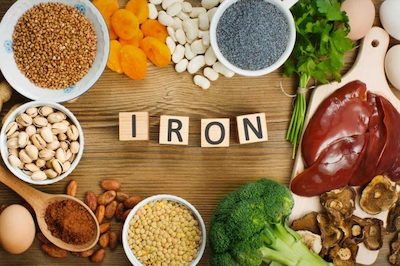Searching for Nigerian foods rich in iron?
Great! Continue reading because in this post you'll discover 15 Nigerian foods high in iron and their iron count.
Let's get started right away.
Nigerian Iron-rich foods list
In no particular order, here's the list of foods rich in iron you can find in Nigeria:
1. Locust Bean
Locust bean (also referred to as dawa-dawa, iru and ogiri) is commonly used as a local seasoning and condiment. Locust beans are rich in plenty of nutrients including iron.
100 grams of Locus beans contains about 33.56mg of iron.
2. Ugwu (fluted pumpkin)
Ugwu needs no formal introduction. Our beloved Ugwu is versatile, delicious and nutrient-rich. One of its nutrient-content is iron. 100g of Ugwu contains around 6.9mg of iron.
3. Afang
Afang is another popular Nigerian vegetable rich in iron. A 100 gram of Afang delivers at least 9.6mg of Iron.
4. Kolanut
Kolanut is one of Nigeria's finest export. It is priced for its traditional, spiritual and health benefits. Kolanut also happens to be rich in iron.
A 100g of kolanut contains around 9.215mg of iron.
5. Alligator pepper
Alligator pepper has a lot of useful culinary and non-culinary benefits. It also contains a high amount of iron. A 100g of alligator pepper supplies a whopping 37.80mg if
6. Brown Beans
Beans are tasty and extremely nutritious. They are high in soluble fiber, plant protein and plenty of other nutrients (including iron). Beans and other legumes contain some iron.
Brown beans are particularly high in iron. A cup of brown beans delivers about 8.613mg of iron.
7. Bitter Kola
Bitter kola is a plant that has long been valued for its medicinal and health-boosting properties. It also contains a reasonable amount of iron. A 100g of bitter kola contains around 6.1mg of iron.
8. African Pear/Ube
Ube is a popular delicious Nigerian treat that goes well with corn. One of the many nutrients found in African pear is Iron. A 100g of Ube contains about 6.01mg of iron.
9. Quail Egg
Pound for pounds quail eggs contain more protein, fat, riboflavin, vitamin B12 and iron than chicken eggs. A 100g of whole quail egg delivers about 5.7mg of iron.
The only downside is that quail eggs are much more difficult to find.
10. Fura de nono
Fura de nono is a northern delicacy that is delicious and nutrient-rich. One of the many nutrients in Fura de nono is iron. A 100g of Fura de nono provides around 7.5mg of Iron.
11. Liver & other Organ Meat
Organ meats like liver, kidney brain, and heart are highly nutritious and delicious. organ meats are one of the best sources of protein, Vitamin A, B vitamins, copper, selenium, choline, and iron (1).
A 100 grams of beef liver delivers around 6.5 mg of iron, which is about 36% of the daily recommended iron intake (2).
12. Beef
Meat is satisfying and rich in protein, B vitamins, selenium, zinc, and Iron (3).
As a matter of fact, Red meat is one of the most accessible sources of heme iron, which might be important for people who are prone to anemia.
In one study looking at changes in iron stores after aerobic exercise, it was observed that women who consumed meat retained more iron than those who took iron supplements. (4).
A 100 grams of ground beef supplies around 2.7 mg of iron, which is about 15% of the daily recommended iron intake (5).
13. Pumpkin seeds
Pumpkin seed is a great source of magnesium, vitamin K, zinc, manganese and Iron (6).
A 100g is of Pumpkin seed contains around 8.8mg of iron. And an ounce (28-gram) serving of pumpkin seeds supplies 2.5 mg of iron, which is around 14% of the daily recommended iron intake (7).
14. cashews
Cashews are a tasty, portable snack. Cashews are not only tasty, but they also have a rich nutrient profile.
100g of dry and roasted cashews contain about 6mg of iron minerals.
15. Dark chocolate
Dark chocolate is not only mouth-watering but surprisingly also have a great nutrient profile and provides many health benefits.
For instance, Studies show that chocolate has positive effects on cholesterol and may reduce your risk of heart attacks, strokes and other heart problems. (8, 9, 10).
Dark chocolate is made from cocoa powder, and 100g of cacao powder contains around 15.5mg of Iron.
Precisely, a 28-gram serving of dark chocolate contains about 3.4 mg of iron, which is around 19% of the daily recommended iron intake (11).
Ensure you're going for dark chocolate with a minimum of 70% cocoa to reap the maximum health benefits of dark chocolates.
What is Iron & Why is it important?
Iron is an essential mineral that is essential for various functions in the body particularly the transportation of oxygen around the body in the form of hemoglobin (12).
A slight deficiency in iron can lead to a condition called anemia, where you would experience fatigue and weakness. There may also be organ failure if iron deficiency becomes chronic (13).
Since Iron is an essential nutrient, it must be gotten from our diet. Fortunately, there are plenty of good food options to help you meet your daily iron needs.
The daily recommended iron intake is 18mg.
Types of Iron
There are two categories of Iron, Heme Iron and Non-Heme Iron.
Heme Iron is obtained mainly from plant sources and is more efficiently absorbed by the body.
Non-heme Iron, on the other hand, is gotten mainly from animal sources and has a lower absorption rate.
Causes of Iron deficiency
Iron deficiency can happen if your intake isn't high enough to offset the amount lost every day. (13).
Iron deficiency is more common in people who fall into the following categories:
Menstruating Women - After menstruation, most women experience a drop in iron levels. Women who have cycles with a heavy menstrual flow are more likely to run into problems. (14)
People with Kidney Failure - People with kidney failure are often suffering from iron deficiency anemia. This can be because their kidneys may not be producing enough erythropoietin hormone which is necessary for the creation of new red blood cells (15).
Pregnant and lactating mothers - A developing fetus requires a lot of iron in the womb and without it they risk becoming anemic. The same can be said after birth through a mother's breast milk (16).
Older infants and toddlers - Infants and toddlers need a lot of iron because their body requires it for growth. Needless to say, they are at risk of getting iron deficient without sufficient intake. (17).
People with low levels of Vitamin A - Vitamin A is needed for the body to soak up and use iron. Without enough Vitamin A, the body cannot regulate its iron levels which can lead to an iron deficiency (18).
People with gastrointestinal disorders - Individuals with diarrhea, ulcers, & other digestive disorders may notget enough iron from their diets. The reason is that iron is absorbed through the lining of the gastrointestinal tract, and it doesn't make it to where it's needed - the bloodstream (19).
Cancer patients - A large percentage (about 60%) of people with colon cancer are deficient in iron and people with other cancers (29-46%) also suffer from this deficiency (20).
People with Heart Failure - Iron deficiency is prevalent in people with heart failure, affecting around 60% of them (21).
Factors that affect iron absorption and Retention
- Your existing iron level. If you have a low iron level, absorption of iron will be high. Otherwise, if you already have an elevated iron level, then the absorption will be low. In general, 10-15% of the iron in food will be absorbed.
- Meat protein increases non-heme iron absorption (22).
- Vitamin C can increase the absorption of iron by as much as 85% from non-heme sources. (23,24)
- Tannins, oxalates, and phytates present in coffee and tea (especially black) reduce the absorption of non-heme iron by up to 65%(24,25,26).
- Phytates, calcium, and polyphenols found in legumes, whole grains, and chocolate can reduce the absorption of non-heme iron(27). Milk and antacids can also inhibit the effects of iron supplements (28).
- Some proteins in soy products may hinder the absorption of non-heme iron (29).
- Foods or drinks that contain caffeine can interfere with the absorption of iron supplements. (30,31).
Warning
People who have a higher-than-normal amount of ferritin (which is an iron-containing protein) in their body might have Hemochronosis. This could lead to organ damage, so it's important that you avoid these high-iron foods. The symptoms include joint pain, fatigue, weakness and weight loss. (15).
Although an overdose of iron is rare and usually only happen when people take iron supplements. Natural sources of iron, like the ones listed below, however, offer a healthy type of iron and can be taken without worry.
Conclusion: Nigerian Foods rich in iron

Iron is an important mineral that your body needs to function properly. Your body can't produce it on its own, so it's important that you take in enough of it each day.
Fortunately, Nigerian foods with some of the highest known Iron content have been shared in the earlier part of this post.
Also, people at higher risk of Iron deficiency and factors that can affect iron absorption have been discussed.

I am so impressed by what I have just learned from this blog.God bless your wisdom.